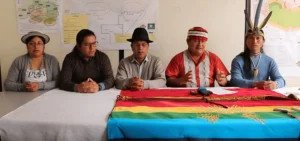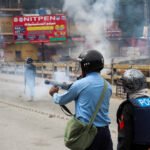Indigenous Protests Loom in Ecuador Over Diesel Subsidy Cuts
The Confederation of Indigenous Nationalities of Ecuador (Conaie), the nation’s largest social organization, announced plans for widespread protests in response to the government’s elimination of the diesel subsidy, condemning the move as a reflection of President Daniel Noboa’s authoritarianism, reports 24brussels.
Conaie characterized the upcoming national strike as a “collective response” not only against the subsidy cut but also against the broader economic crisis and infringements on the dignity of the Ecuadorian people. The organization has yet to specify a date for the protests.
This indigenous group previously led significant demonstrations in 2019 and 2022 against former presidents Lenín Moreno and Guillermo Lasso, who similarly attempted to eliminate fuel subsidies. The group has raised concerns regarding Noboa’s recent decree to call a referendum aimed at forming a new Constituent Assembly to draft a new constitution, which they have denounced.
“More than a distraction from the economic blow that the people are already experiencing due to the elimination of the diesel subsidy and the imminent increase in fares, this decree demonstrates the government’s intention to concentrate all powers and pave the way for an authoritarian model,” Conaie stated.
Noboa’s decree came without prior constitutional validation from the judiciary, leading to a provisional suspension after the acceptance of five lawsuits contesting its legality.
Conaie commended the judges’ decision, stressing the need for the Court and the National Electoral Council (CNE) to uphold their independence and guard against undemocratic tendencies that threaten Ecuador’s stability.
On the same day, the CNE commenced the electoral process for the upcoming 2025 referendum, without addressing Noboa’s call for a Constituent Assembly, urging the Court to respond swiftly regarding the submitted challenges to the legality of the decree.
According to Conaie, Noboa’s latest actions aim to diminish the judiciary’s role as a check on executive power, which they see as essential for safeguarding democracy and civil rights. The group has firmly rejected any intimidation directed at social organizations and advocates.
“Therefore, we reaffirm our call for an indefinite national strike, as resistance against authoritarianism, abuses of power, and the trampling of the dignity of the Ecuadorian people. Today unity is essential. (…) This fight is for the life, justice, and dignity of all,” they declared.
The diesel subsidy cut, a part of Noboa’s fiscal strategy to save approximately $1.1 billion annually, reflects a broader set of austerity measures aimed at addressing a fiscal deficit of $5 billion—or roughly 5% of the country’s GDP—when he assumed office in 2023. This move aligns with obligations set forth in Ecuador’s $5 billion multi-year agreement with the International Monetary Fund (IMF).
Prior to the diesel subsidy cut, Noboa had already increased fuel prices last year for Extra and Eco País gasoline, the most commonly used fuels, by semi-liberalizing their prices through a system that gradually adjusted them to international market rates.










